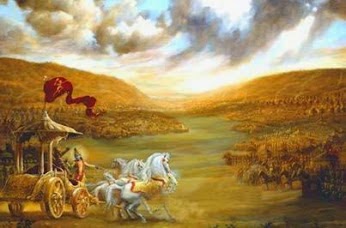Gita : Ch-1. Slo-42.
Srimad Bhagavad-Gita :
Chapter- 1. ( Arjuna-vishadha-yogam)
Slokam-42. ( When there is increase of unwanted population, a hellish situation is created both for the family and for those who destroy the family tradition. In such corrupt families, there is no offering of oblations of food and water to the ancestors. )
sankaro narakayaiva kulaghnanam kulasya ca,
patanti pitaro hyesham luptapindodakakriyah.
sankarah = ( of the mixing of varnas ), such unwanted children;
kulaghnanam kulasya ca = also of the kulam/vamsam/family/dynasity, of those who are the destroyer of kulam;
narakaya eva = certainly attain the narakam ( hell );
hi esham pitarah = why because, their ( the destryers of kulam and the result of mixing of varnas/ the unwanted
children) ancestors /fore-fathers ( pitru-s ) -pitarah;
luptapindodakakriyah = without the kriya after the death, such as offerings ( pinda) and water;
patanti = fall down.
According to the rules and regulations of fruitive activities, there is a need to offer periodical food and water to the forefathers of the family. This offering is performed by worship of Vishnu, because eating the remnants of food offered to Vishnu can deliver one from all kinds of sinful actions. Sometimes the forefathers may be suffering from various types of sinful reactions, and sometimes some of them cannot even acquire a gross material body and are forced to remain in subtle bodies as ghosts. Thus, when remnants of prasadam food are offered to forefathers by descendants, the forefathers are released from ghostly or other kinds of miserable life. Such help rendered to forefathers is a family tradition, and those who are not in devotional life are required to perform such rituals. One who is engaged in the devotional life is not required to perform such actions. Simply by performing devotional service, one can deliver hundreds and thousands of forefathers from all kinds of misery. It is stated in the Bhagavatham:
"Anyone who has taken shelter of the lotus feet of Mukunda, the giver of liberation, giving up all kinds of obligation, and has taken to the path in all seriousness, owes neither duties nor obligations to the demigods, sages, general living entities, family members, humankind or forefathers." (Bhag. 11.5.41) Such obligations are automatically fulfilled by performance of devotional service to the Supreme Personality of Godhead.
In the previousslokam the effects of the intermixture of castes as described in the Vedic scriptures regarding the ancestors has been determined. Now Arjuna describes the misery experienced for those who are responsible for causing this intermixture of castes beginning with dosair etaih. Due to these evils the essential duties prescribed in the Vedic scriptures for the four castes which are the authorised and proven means leading humanity to the highest good and which are faithfully instructed by holy sages and spiritual masters are all forsaken.
Now the conclusion of the sins that have been previouly deleniated before are being described. Jati-dharmah refers to the duties of the ksatriyas and others. Kula-dharmas refers to the traditional practices observed by a particular family. Utsadayate means when these are eradicated. The use of the word ca meaning also indicates that asrama-dharma which is the rules of righteousness governing the relationship between brahmana the spiritual order, ksatriya the warrior order, vaisya the mercantile order and sudra the worker class are included here as well.
To be continued ...




Comments
Post a Comment